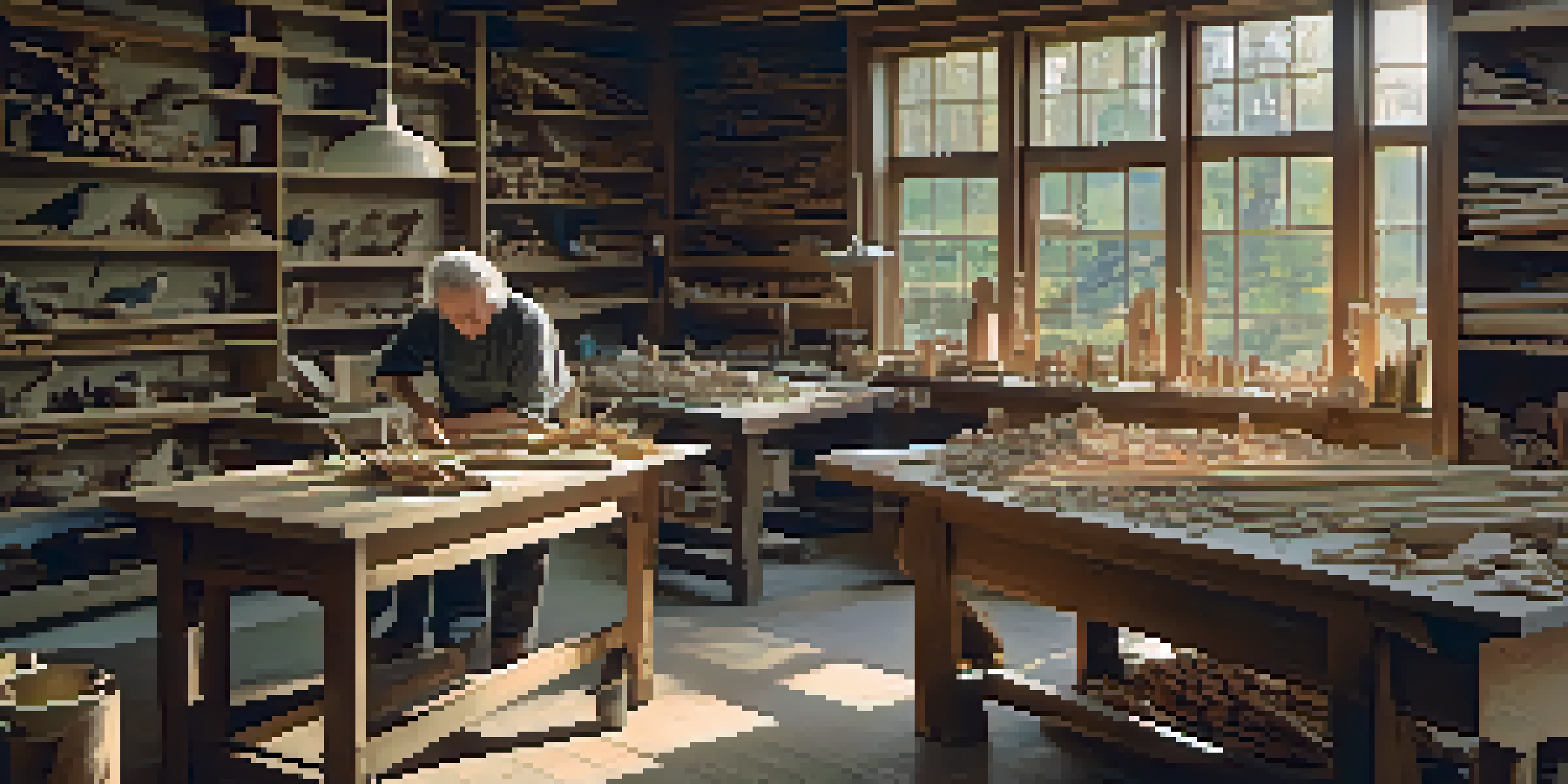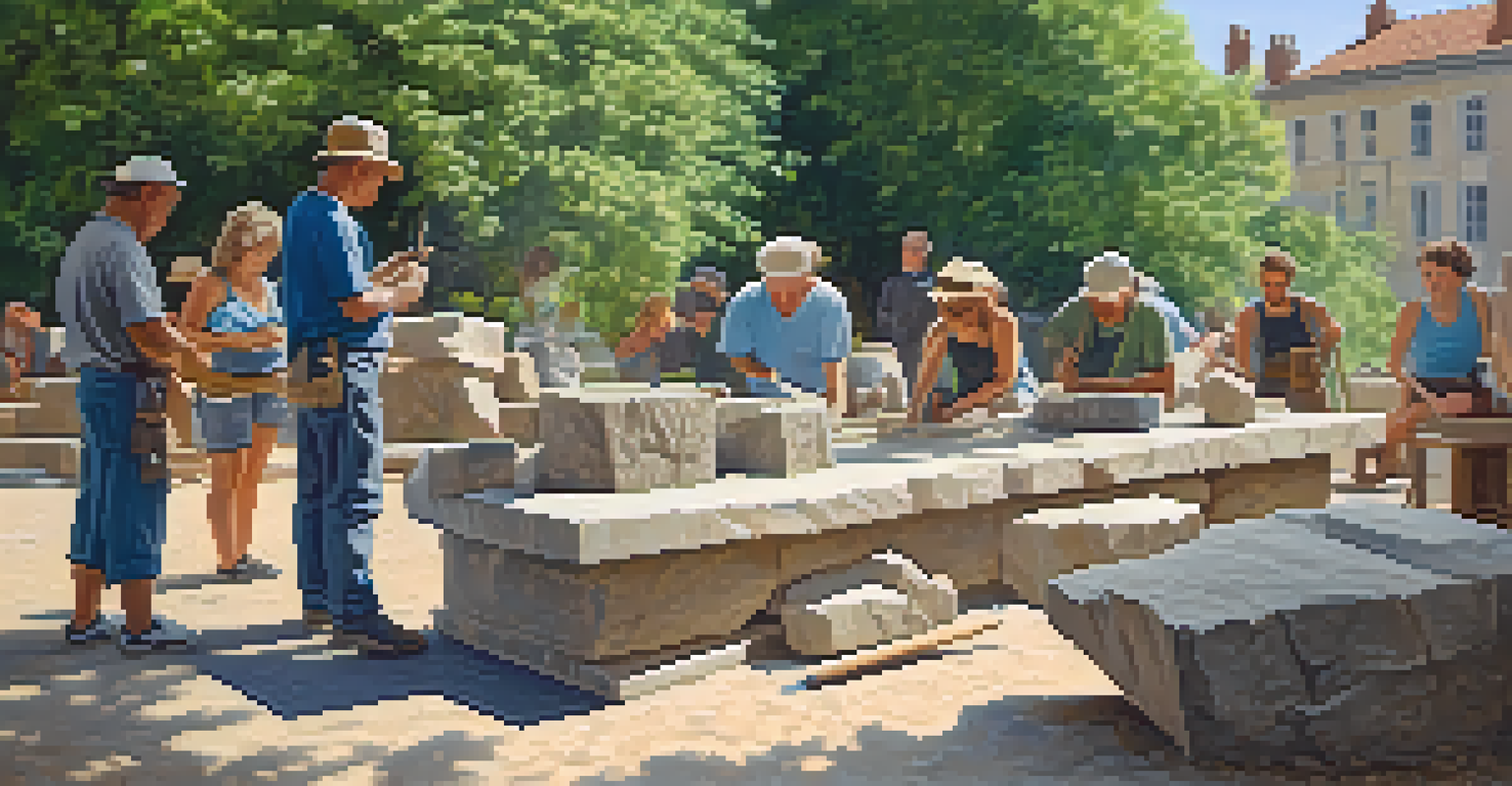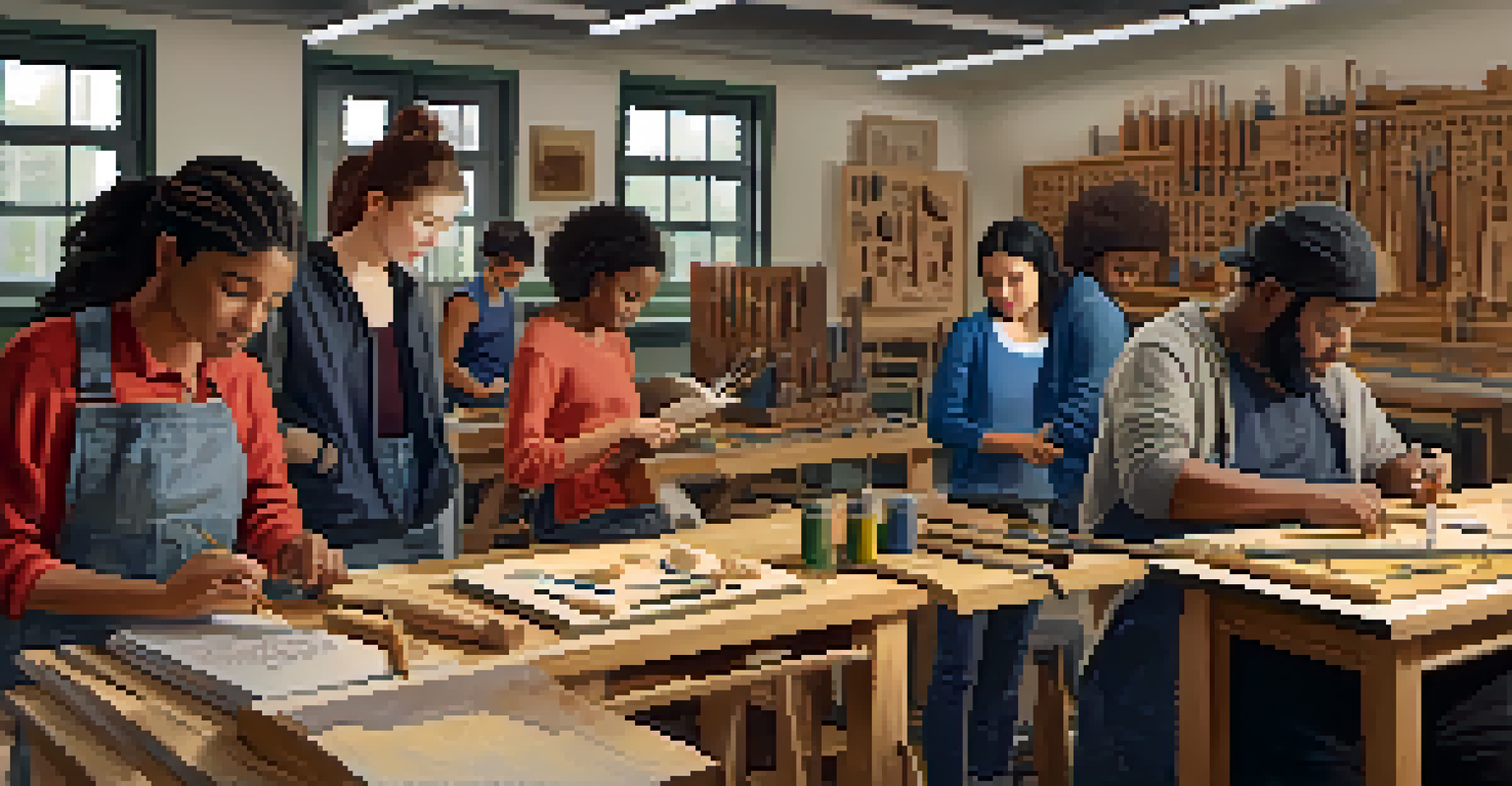Finding Carving Classes: Tips for Beginners and Experts

Understanding What Carving Classes Offer You
Carving classes can range from beginner workshops to advanced techniques that cater to seasoned artists. These classes typically involve learning different styles, tools, and materials used in carving. Whether you’re looking to carve wood, stone, or even ice, each medium has its own unique approach and techniques.
The only way to do great work is to love what you do.
For beginners, classes often start with the basics, such as understanding tools and safety measures, while experts might focus on refining their skills or exploring new styles. This diversity ensures that everyone, regardless of their skill level, can find valuable lessons. Plus, learning in a structured environment can help accelerate your progress.
Additionally, these classes provide an opportunity to connect with fellow enthusiasts, fostering a creative community. Sharing experiences and tips with others can enhance your learning process and inspire new ideas. In essence, carving classes offer a blend of education and camaraderie that enriches the craft.
Identifying Your Carving Interests and Goals
Before diving into the search for carving classes, it’s essential to pinpoint your specific interests and goals. Are you drawn to the intricate details of wood carving, or do you prefer the bold expressions found in stone? Understanding your passion will help you select classes that align with your creative vision.

Setting clear goals can also motivate you throughout your learning journey. Perhaps you want to create a functional piece of art or simply enjoy the meditative process of carving. Whatever your aim, knowing it will guide your class selection and help you stay focused.
Carving Classes Foster Community
Joining carving classes not only enhances your skills but also connects you with a supportive network of fellow enthusiasts.
Moreover, having a clear direction allows instructors to tailor their guidance to suit your needs. This personalized approach can make your learning experience more effective and rewarding. By articulating your interests, you'll make the most out of your carving classes.
Researching Local and Online Carving Classes
In today’s digital age, finding carving classes is easier than ever, thanks to a plethora of online and local options. Start by searching online platforms that specialize in art classes, such as Skillshare or Udemy, where you can find a variety of carving tutorials suitable for all levels. These platforms often feature reviews and ratings, helping you choose a class that fits your needs.
Art is not freedom from discipline, but disciplined freedom.
Don’t forget to explore local community centers, art schools, or woodworking shops, as they frequently offer hands-on classes. Attending in-person sessions can provide immediate feedback from instructors and the chance to network with other artists. Additionally, local classes often foster a sense of community that online courses may lack.
As you research, consider the credentials of instructors and the curriculum offered. A well-structured class that emphasizes both theory and practice will enhance your learning experience. Taking the time to find the right class can significantly impact your development as a carver.
Evaluating Class Size and Learning Environment
When choosing a carving class, consider the class size and the overall learning environment. Smaller classes often allow for more personalized attention from instructors, which can be particularly beneficial for beginners. In a more intimate setting, you can ask questions freely and receive tailored guidance as you develop your skills.
On the other hand, larger classes may expose you to a broader range of ideas and techniques. They can foster a vibrant atmosphere where students inspire each other. However, be mindful that in a larger setting, you might not receive as much direct feedback, which could impact your learning.
Choose Classes Based on Goals
Identifying your specific interests and goals in carving helps you select classes that align with your creative ambitions.
Ultimately, the ideal class size depends on your personal learning style. Some thrive in collaborative environments, while others prefer focused instruction. Assess what works best for you to ensure a productive and enjoyable carving experience.
Checking Class Schedules and Flexibility
Another crucial aspect to consider is the class schedule and its flexibility. Look for classes that fit your availability, whether you prefer weekend workshops or evening sessions. Many instructors now offer both in-person and online options, giving you the freedom to choose what works best for your lifestyle.
Flexibility also extends to the pace of the classes. Some may offer intensive courses over a few days, while others might spread lessons out over several weeks. Determine which format aligns with your learning preferences and personal commitments.
Being able to attend classes without feeling rushed or stressed can significantly enhance your learning experience. Prioritize your schedule to ensure that you can fully engage and immerse yourself in the carving process.
Understanding Costs and Material Requirements
Cost is an important factor when selecting a carving class. Classes can vary widely in price depending on the instructor's experience, location, and materials provided. Some courses may include all necessary tools, while others may require you to purchase or bring your own supplies.
As a beginner, it might be wise to start with classes that offer starter kits or provide materials for use during sessions. This can alleviate the burden of investing in tools before you’re sure of your commitment to the craft. On the other hand, experienced carvers may prefer classes that allow them to use their own tools.
Evaluate Class Size and Flexibility
Considering class size and schedule flexibility is crucial to ensure a productive and enjoyable learning experience.
Before enrolling, always inquire about any additional costs associated with the class. Understanding the total investment required will help you budget effectively and avoid surprises down the line. A clear picture of costs can ease your decision-making process.
Exploring Advanced Techniques for Experienced Carvers
For those with some carving experience, seeking classes that focus on advanced techniques can be incredibly rewarding. Look for workshops that delve into specialized methods, such as relief carving, carving in the round, or even intricate detailing. These classes can help you refine your skills and push your creative boundaries.
Participating in advanced classes often involves collaborative projects, allowing you to learn from peers and instructors alike. Sharing knowledge and techniques within a community of experienced carvers can lead to new insights and perspectives. This interaction can inspire you to experiment with your style and approach.

Additionally, advanced classes may offer critiques and feedback sessions, which are invaluable for personal growth. Constructive criticism can help you identify areas for improvement and encourage you to take risks in your artistry. Embracing these challenges can elevate your carving to new heights.
The Joy of Joining a Carving Community
Finally, one of the greatest benefits of taking carving classes is the opportunity to join a community of like-minded individuals. Engaging with fellow carvers can lead to lasting friendships and collaborative projects, fostering a supportive environment where everyone can thrive. Sharing your journey with others adds a layer of enjoyment to the learning process.
Participating in community events, exhibitions, or online forums can further enhance your experience. These platforms allow you to showcase your work, receive feedback, and gain inspiration from others. Plus, they can keep you motivated and excited about your carving journey.
Ultimately, the connections you build can be just as valuable as the skills you acquire. Embrace the opportunity to learn from others, share your passion, and contribute to the vibrant world of carving. The friendships and support you find along the way can make your carving journey all the more fulfilling.